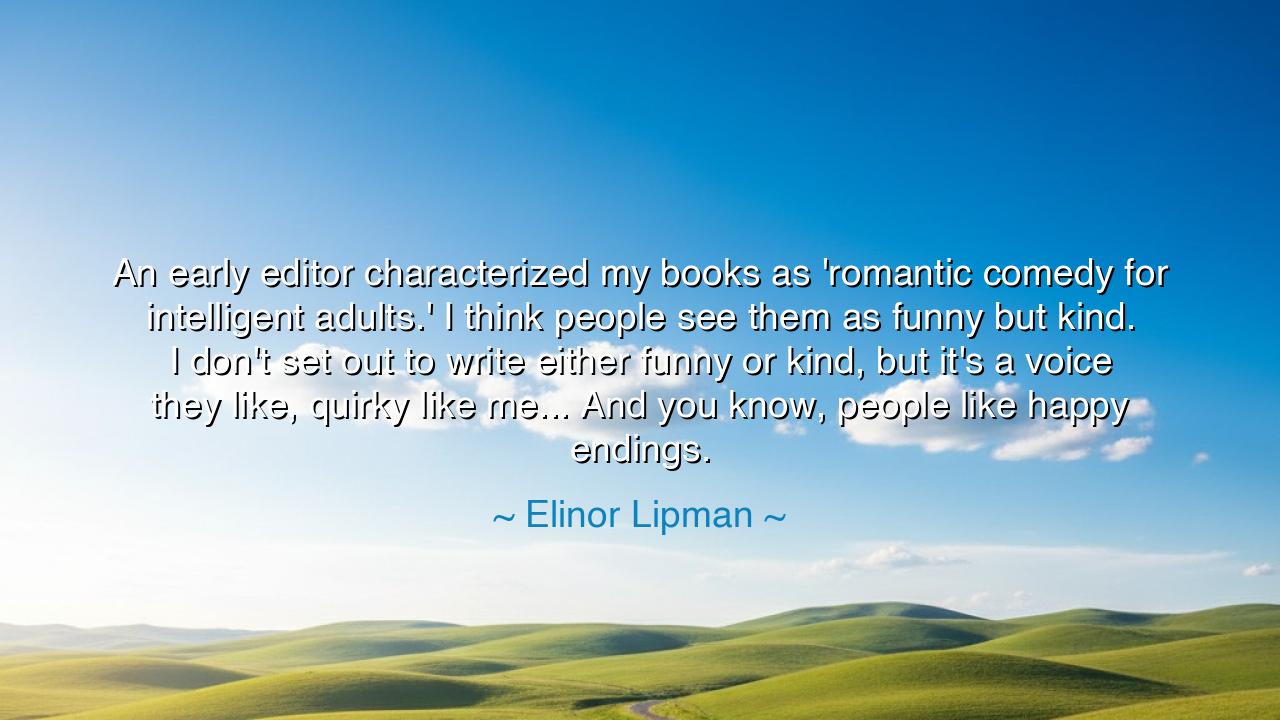
An early editor characterized my books as 'romantic comedy for
An early editor characterized my books as 'romantic comedy for intelligent adults.' I think people see them as funny but kind. I don't set out to write either funny or kind, but it's a voice they like, quirky like me... And you know, people like happy endings.






Gather close, my children, for the words of Elinor Lipman speak of a truth that transcends time and place, one that touches the very heart of human nature. She said: "An early editor characterized my books as 'romantic comedy for intelligent adults.' I think people see them as funny but kind. I don't set out to write either funny or kind, but it's a voice they like, quirky like me... And you know, people like happy endings." In these words, there lies a deep reflection on the art of storytelling, and on the power of humor and kindness to resonate with the souls of those who seek not just entertainment, but a glimpse of joy, a taste of the good and the beautiful in a world often burdened by the weight of sorrow.
Romantic comedy, my children, is a genre that has long been cherished in both the halls of the ancient and the modern world. From the playful antics of Shakespeare's "Twelfth Night" to the lighthearted tales of today, this form of storytelling has always provided not just amusement, but a safe haven—a world where love triumphs, where misunderstandings are resolved, and where joy, despite all odds, prevails. Yet, Elinor Lipman does not claim to simply craft tales of fleeting fun or superficial laughter. She speaks of writing for intelligent adults, for those whose hearts yearn for more than just jokes—they long for a voice that resonates with the complexities of life, a voice that is both quirky and kind, a voice that speaks to the deeper parts of our nature.
Consider, my children, the ancient tales of Aesop's fables, where wisdom and wit are intertwined. Aesop, though a storyteller of simple tales, conveyed profound truths about the nature of humankind. His fables were not mere entertainment, but tools to shape the hearts of the people, to offer them wisdom through stories that were both humorous and deeply moral. Elinor Lipman, like Aesop, understands that humor is not simply the art of making others laugh, but a means to reveal truth, to expose the quirks of human nature, and to find kindness even in the midst of chaos. Her stories are not just for amusement—they are for growth, for reflection, and for the nourishing of the soul.
Indeed, like the work of the great playwright Molière, whose comedies often explored the flaws of human nature through wit and satire, Lipman’s tales carry both humor and insight. Molière's characters, though foolish and exaggerated, often reveal profound truths about society, and through their comedic actions, the audience is invited to reflect upon their own lives. Lipman’s stories, while lighter in tone, carry the same underlying wisdom—the recognition that, though life can be difficult and confusing, there is always room for kindness, for understanding, and for love. And it is through these elements that her readers find comfort, not in the perfection of the world, but in the humanity that binds us all.
But what, my children, is it about the "happy ending" that speaks to the hearts of so many? Is it not a symbol of hope, a reminder that even in the darkest of times, there is always the potential for joy and resolution? From the epic tales of ancient heroes who overcame unimaginable trials to the modern stories of ordinary people who find love against all odds, the happy ending is a beacon—a promise that no matter the trials we face, there is a possibility for reconciliation, for growth, and for the renewal of the heart. To seek a happy ending is not to deny the struggles of life, but to recognize that even in the face of hardship, we can still find moments of beauty and peace.
Reflect, my children, on the story of Odysseus, that ancient hero who, after long years of wandering and suffering, finally returns to his home. His journey was fraught with danger, with loss, and with the weight of the unknown, yet he never gave up hope of reuniting with his beloved wife, Penelope. His return, though hard-won, was a celebration of faith, patience, and love. In this, we see the power of the happy ending—not as the end of the story, but as the fulfillment of all that came before it. Elinor Lipman’s works, too, offer such endings, where the characters’ struggles are not erased but transformed into something more hopeful, more kind.
And so, my children, let us learn from the works of Elinor Lipman and those like her, who remind us that laughter and kindness are not frivolous things, but powerful forces that shape our world. They teach us that even in the most ordinary of lives, there is beauty, there is humor, and there is love. We do not need to search for perfection, for quirky voices and romantic endings can offer us the greatest gifts of all—the chance to reflect on who we are and who we might yet become. Let us seek out those moments of lightness, and let them guide us toward joy, not as an escape from the world’s challenges, but as a way to transform them, to bring us closer together, and to remind us that, indeed, happy endings are not just possible—they are worth striving for.






AAdministratorAdministrator
Welcome, honored guests. Please leave a comment, we will respond soon